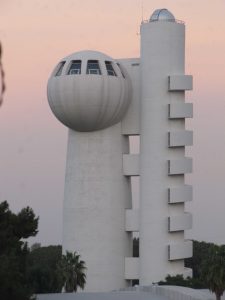Having few mineral resources, Israel from the beginning had to rely on its human capital and human ingenuity. Israel devotes 5% of its GDP to R&D – more than any other country. Unparalleled entrepreneurship makes Zion an incubator for innovative companies and start-ups. Moreover, theoretical education and research are quickly put to practical use. This is also evident in the military sector…

Particle accelerator at Weizmann Institute
© Elikrieg / Wikimedia / (CC BY-SA 3.0) / https://creativecommons.org/licenses/by-sa/3.0/deed.de
Jaffa oranges! When the State of Israel was founded 70 years ago, citrus fruit were the country’s only significant export item. But then as now, Israel faced strategic economic and political challenges that have remained fundamentally unchanged, even as they have taken on new strategic forms. In 1948, fewer than 700,000 people lived in the Jewish state. The country had no significant mineral resources. And shortly after the proclamation of Israel, the new state was invaded by the armies of several Arab nations.
To secure its existence as a state and as the Jewish national homeland, Israel promoted Jewish immigration. This policy proved a success. Within just three years, nearly 1.5 million people arrived in Israel. Today, the country is home to nearly nine million citizens. From the very start, national founder David Ben-Gurion and his government understood that Israel’s economy could not rest only on the export of citrus fruit. Instead the country would need to rely on the only resource it had in ample quality and supply – human capital and human ingenuity.
This view also accorded with a deep understanding of Jewish history. For the Jewish people of the Diaspora, preserving their identity over thousands of years in the face of persecution was in part accomplished by preserving their tradition of scholarship and the life of the mind. Historically, most Jews were able to read. As soon as Jews attained some measure of emancipation, these intellectual skills gave rise to unusual accomplishments in the areas of science, art, culture and business.
Israel’s first President, Chaim Weizmann (1874–1952), was a distinguished chemist. Today the world-renowned Weizmann Institute of Science in Rehovot, southeast of Tel Aviv, ranks among the country’s most important research facilities. Many of the best Jewish scientists from around the world spend at least part of their career there. At the institute, they are free to pursue their own research interests. In return, they must generate a large share of their budget through income from patents or through cooperative agreements with industry. Israel also has five major universities: the Hebrew University of Jerusalem, Tel Aviv University, Bar-Ilan University in Ramat Gan, the Institute of Technology in Haifa, and Ben-Gurion University in Beer Sheva. Israel devotes 5% of its GDP to research and development – more than any other country in the world. Some 50% of the adult population have completed tertiary education, placing the country among the most educated worldwide. Israel also trains the most engineers as a share of its population. These figures are just some of many that demonstrate the value that Israel attaches to its human capital.

Hightech-park Nazareth
Dr. Avishai Teicher Pikiwiki Israel / Attribution 2.5 Generic / https://creativecommons.org/licenses/by/2.5/deed.en
Putting to practical use
As the Weizmann Institute illustrates, Israel does not only support theoretical education and research. Wherever possible, this research is put to practical use. This is most evident in the military sector. Since everyday life in Israel continues to be shaped by terror and by the strategic threat posed by Iran and other countries, the Israeli military must be able to quickly provide technological solutions to any threats. This is done with particular effectiveness in the Israel Defense Force’s Unit 8200, whose specialists are tasked with deploying the latest technology against new challenges rapidly and with little preparatory groundwork. Among the successful examples are the Iron Dome and Arrow missile defense systems.
After completing their military service, many of these young specialists continue to work in the field of data technology. Many have joined forces with scientists and researchers to launch successful start-ups. One example is the driver-assistance system Mobileye. Co-founded by Amnon Shashua, who received his Master’s degree at the Weizmann Institute, Mobileye was eventually acquired by an American multinational for some $15 bn.
Israel’s economy rests on its human capital. And the root of that human capital lies in the history of the Jewish Diaspora, which has flowed into the State of Israel. In Israel, theoretical knowledge was confronted and enriched with the demand for practical application. The Israeli success story will continue to evolve. Until recently, the country’s Haredi Jews and its Arab population have remained on the sidelines. But now these two groups are beginning to take part in the country’s economic development, particularly in the area of data technology. ■
